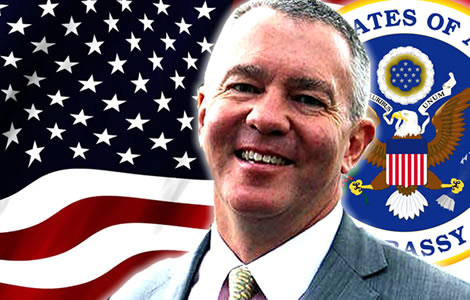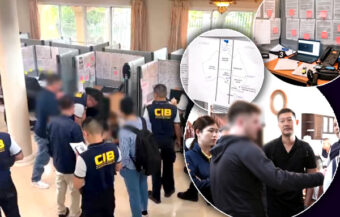BANGKOK: Michael DeSombre appeared to express regret that Thailand has not been willing to upgrade its labour laws to strengthen the bargaining power of workers and other progressive changes to bring the kingdom’s workplace environment up to world standards and so prevent the loss of benefits under the GSB system which, it is thought, will cost Thai exporting firms $1.3 billion a year from April 25th next.
The new US ambassador has expressed regret that Thailand has not been willing to compromise on American demands that it improve its labour laws applying to workers in the kingdom to prevent the loss of trade benefits under the GSP tariff system which will take effect at the end of April. The new US envoy also highlighted the November election in the United States as critical to US investment decisions on Thailand.

The new US Ambassador to Thailand, Michael G DeSombre, has highlighted the significance of the November election stateside for American firms considering investments in Thailand.
Michael DeSombre was appointed by US President Donald Trump in July 2019 and confirmed by the US Senate on January 8th. A lawyer with extensive experience working with American firms in the Asia Pacific region through international US law firm Sullivan and Cromwell, Mr De Sombre previously held the key role as Head of Mergers and Acquisitions in Asia with that firm.
He is a family man with four children and was educated at Stanford University studying economics and business in East Asia while later obtaining a PHD in legal jurisprudence from Harvard.
Key decisions to move production out of China on hold until after November’s US elections
Speaking to reporters on Wednesday, he highlighted that many US firms will be holding off on decisions to move production facilities out of China and into Southeast Asian countries depending on the result of the US election in November where it now looks like President Trump will be squaring up against former Obama Vice President, Joe Biden.
Ambassador DeSombre did indicate that many US firms are interested in investing in Thailand including the Eastern Economic Corridor and other areas under the 1966 Amity treaty
Ambassador highlighted the suspension of duty-free GSP concessions to Thailand from April 25th
Mr DeSombre highlighted the fact that on April 25th, Thailand will lose its preferential status under the US General System of Preferences tariff regime.
The US ambassador pointed out that Thailand will still benefit from the system to the tune of $3.4 billion under adjusted GSP rates although the loss resulting by the removal of the tariff protections is estimated to be $1.3 billion.
This is expected to have a considerable bearing on already struggling Thai exporters although there are conflicting opinions on the issue.
At the US ASEAN summit, in November last, US Commerce Secretary Wilbur Ross played down the impact while the Chairman of Thailand’s Bangkok Bank, Deja Tulananda, warned that the effects could be considerable for some Thai firms reliant on the US market.
One Thai government agency, just after the shock announcement, played down the impact suggesting it would be negligible at only 0.01% of exports
Thailand has resisted pressure to update its labour laws according to US Ambassador DeSombre this week
Thailand has resisted US pressure to change its labour laws, which many in Washington see as sub-par. DeSombre said the willingness by Thai authorities to amend the law relating to labour issues such as the bargaining power of workers and assembly rights were fundamental to US demands.
This, he pointed out, was the basis for the decision by the United States late last year to remove Thailand’s preferential status under the General System of Preferences or GSP system.
Last year, at the ASEAN summit, the Thai prime minister indicated that the Thai government and public had to respect US laws and decisions of the US Congress.
However, he did indicate that Thailand would have difficulty changing its laws at the behest of another country.
‘The labour issues are tied with our legal system, and we cannot change the law whenever we like based on other countries’ opinions. This is a complicated issue that requires compromise and balance between domestic administration and maintaining international relationships,’ General Prayut told reporters even as he prepared to engage with the US commerce secretary.
This impasse was acknowledged by the US Ambassador on Wednesday when he said: ‘So, at this stage, there really is no opportunity to prevent the loss of the preferences. It is important to note, however, that even after the loss of that one-third Thailand will still be the largest beneficiary of the GSP at over $3.4 billion. So, it has to be kept in perspective.’
Withdrawal of GSP privileges linked to the ban
At the time, many considered the move a response to Thailand’s decision to go ahead with a pesticide ban of mainly US products that senior US officials had asked the Thai government to postpone.
Subsequently, Thailand shelved or postponed the ban in circumstances which are still controversial.
Optimistic about a Phase 2 trade deal with China
Mr DeSombre was more optimistic about the future US-China trade negotiations noting that Phase 1 had been completed successfully. He said that he was looking forward to Phase 2.
Standoffish position on students protests
When questioned about the recent student protests in Thailand, the ambassador adopted a more standoffish position and expressed a view that the United States respected Thailand’s sovereignty and its approach to democracy. He described democracy as a ‘messy’ issue.
The United States along with the European Union and Canada did make a statement on last month’s dissolution of the Future Forward Party. The US struck a more moderate tone focusing on its concern for the rights of representation for over 6 million voters who voted for the party in the General Election of March 2019. It said it feared that they may be left disenfranchised.
Even this drew stinging criticism from ultra-conservative Thai activists who are very sensitive to comments and interference from external powers, in particular, the United States.
Some government figures also rebuked the US for its statement.
Trump and his policies still the biggest factor not only in US Thai relations but the World economic picture
Being a diplomat, the ambassador is constrained from venturing into politics particularly domestic politics at home in the US.
The truth, of course, is that Thailand very much will be influenced by the outcome of the US election just as Thailand’s economy was devastated last year by the US-China trade war which was the direct result of a new bilateral trade policy pushed by the current US President.
This is likely to strengthen or at least be more deeply embedded if he is re-elected in November.
Further reading:
PM readies his team to tackle the US withdrawal of Thailand’s preferred partner status
UN Secretary-General warns of a fractured world at the ASEAN summit over US-China split


















